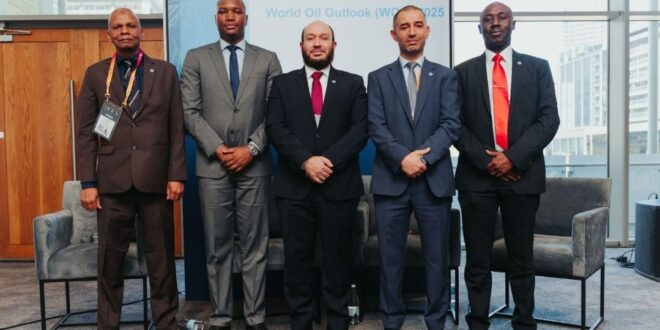Cape Town – Reda Helal:
The Organization of the Petroleum Exporting Countries (OPEC) emphasized Africa’s pivotal role in global energy markets during African Energy Week (AEW) 2025: Invest in African Energies, held in Cape Town.
Officials highlighted that Africa is set to witness a major surge in energy demand over the coming decades, requiring massive investment and the adoption of realistic pathways that balance economic growth with environmental sustainability.
During a dedicated workshop presenting the findings of the 2025 World Oil Outlook, Dr. Abderrezak Benyoucef, Head of OPEC’s Energy Studies Department, underscored that global primary energy demand is projected to increase by 23% by 2050, with non-OECD countries accounting for nearly three-quarters of this growth.
He noted that Africa alone is expected to add 4.2 million barrels per day (bpd) of incremental oil demand, while also contributing around 3 million bpd to global refining capacity in the long term.
“There are no signs of global oil demand peaking anytime soon in our outlook,” Dr. Benyoucef stated. “We need more investment and realistic future energy pathways. Africa requires more energy to drive economic development – not only electricity, but also to expand clean cooking access and improve health and education outcomes. Liquefied Petroleum Gas (LPG) is one of the key solutions.”
According to OPEC’s projections, oil will maintain the largest share of the global energy mix through 2050, while natural gas is set to overtake coal as the world’s
second-largest energy source. Developing countries are expected to account for 75% of incremental electricity demand, underscoring the urgent need for targeted investment in Africa’s power and downstream sectors.
OPEC stressed that the world will require $18.2 trillion in cumulative energy investment by 2050, including $14.9 trillion for upstream oil and gas projects.
Dr. Benyoucef further emphasized the necessity of scaling up carbon capture, utilization, and storage technologies to reduce emissions while meeting growing energy needs.
Adding to the macroeconomic context, Dr. Sulaiman Saad, Senior Oil Demand Analyst at OPEC, observed that the global economy is becoming increasingly resilient, driven by strong growth momentum in China, the United States, and India.
However, he cautioned that challenges remain, including rising sovereign debt, fragmented supply chains, and uneven industrial recovery.
On the downstream front, Mohammed Attaba, Senior Downstream Oil Industry Analyst at OPEC, noted that refining capacity growth is increasingly shifting toward developing economies.
“The migration of refining capacities from developed to developing countries has been a clear and ongoing trend for several years now,” he said.
These insights reaffirm that Africa stands at the heart of the global energy equation.
The continent’s future will depend on attracting large-scale investment and adopting sustainable technologies that ensure both energy security and inclusive development.
 موقع وجه أفريقيا موقع وجه أفريقيا هو موقع مهتم بمتابعة التطورات في القارة الأفريقية
موقع وجه أفريقيا موقع وجه أفريقيا هو موقع مهتم بمتابعة التطورات في القارة الأفريقية



